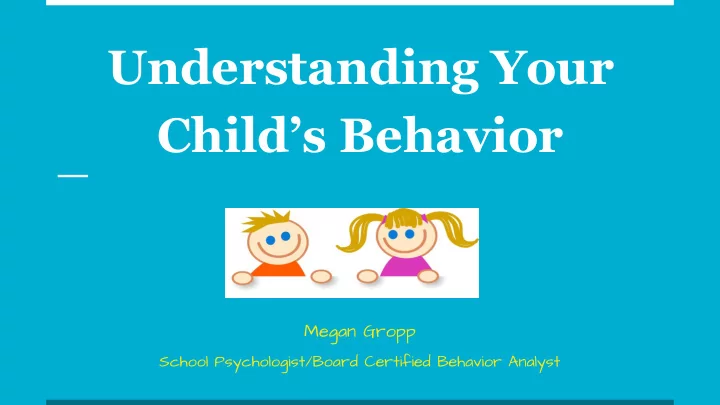

Understanding Your Child’s Behavior Megan Gropp School Psychologist/Board Certified Behavior Analyst
CONSIDER: “If a child doesn’t know how to read, we teach.” “If a child doesn’t know how to swim, we teach.” “If a child doesn’t know how to multiply, we teach.” “If a child doesn’t know how to drive, we teach.” “If a child doesn’t know how to behave, we…………teach? ………..punish?” “Why can’t we finish the last sentence as automatically as we do the others?” Tom Herner (NASDE President, Counterpoint 1998, p.2)
--BEHAVIORAL FACTS-- Human Behavior: - is learned - is communication - is a function of the environment Therefore: - new behavior can be taught - old behaviors can be unlearned - we change behavior by changing the environment
--BUT WHY DO THEY DO IT?-- Because it works for them! ALLOWS THEM TO ACCESS/AVOID: 1. Attention 2. Escape 3. Tangible
--FIGURE OUT PATTERNS & TRIGGERS-- Pay attention to ENVIRONMENT and SETTING - What happens immediately before behavior - What happens immediately after behavior - Where does behavior occur - When does behavior occur - Who does the behavior occur with
--BEHAVIOR EXAMPLE-- A B C (what happens before) (Behavior) (What happens after) Parent and child are waiting Adam yells, cries, stomps Eventually parent says “ok, in the checkout line in the feet loudly for long period of ok, I’ll buy it” grocery store. Adam asks time. parent to buy him a candy bar and the parent says no.
--BEHAVIOR EXAMPLE-- A B C (antecedent=what happens before) (Behavior) (consequence=what happens after) Josie is playing outside. Josie runs away. Josie gets to play outside Parent says, “Time to come longer and delays cleaning inside and clean your room. room.”
--BEHAVIOR EXAMPLE-- A B C (antecedent=what happens before) (Behavior) (consequence=what happens after) Parent is on the phone. Child yells repeatedly Parent frustrated says loudly Sam comes over and says “Mom/Dad” and starts “What! I’m on the phone”. “Mom/Dad”. Parent ignores stomping feet while pushing and continues talking. Child hard on parent. pulls on parent’s pant leg and says louder “Mom/Dad”, parent continues talking on phone.
PERSONAL EXAMPLES?? A B C (antecedent=what happens before) (Behavior) (consequence=what happens after)
--STOP PROBLEMATIC BEHAVIOR-- (1) Don’t let the behavior work for them anymore! and (2) Give them alternative ways to access/gain what they want (attention, escape, tangible) by engaging in appropriate behaviors
--EXTINCTION BURST-- IT GETS WORSE BEFORE IT GETS BETTER! Behaviors will likely increase, before they decrease
--De-Escalate Intense Behavior-- To De-Escalate a child engaged in behavior: - get on child’s eye level - use a calm voice/tone/facial expression - the fewer words, the better - state expectation (exactly what you want them to do) - don’t engage in the battle or argument
--De-Escalate Intense Behavior-- 1-2-3 Magic Purpose: Give everyone a chance to step back from difficult situation and calm down; when child emotionally overwhelmed For behaviors you want them to START or STOP ● Give them a very brief explanation of concern at beginning ● Key Elements: No Emotion or Rationalizing/Explaining ○ “That’s a 1”, wait 5 seconds ● If behavior continues, “That’s a 2”, wait 5 seconds ● If behavior continues, “That’s a 3 Time Out” ● www.123magic.com www.123magic.com
--DURING BEHAVIOR-- Ignore inappropriate behavior (don’t provide reinforcer) ★ Continue to place demand/expectation you initially made ★ Be careful what you threaten…. But always do what you say you will do ★ Reminder of replacement behavior (use your words…..) ★ Choices: 2 ways for the child to accomplish what YOU want them to do ★
--CONSEQUENCES/PUNISHMENT-- (1) Make appropriate and reasonable; related to behavior (2) Timing of punishment (3) Natural consequences are ok; let them experience (4) Allow them to earn or not earn (rather than always taking away)
--BEHAVIOR CHANGE: PREVENTION-- Attention for positive behavior (3:1 ratio positive to negative) ★ Unconditional attention (15 minutes playing) ★ Choices (two ways for them to accomplish what YOU want) ★ First- Then (1st clean your room, then play outside) ★ Warnings for demands: 10 minutes until dinner, 5 minutes until, 1 ★ minute until Select 1-2 behaviors to change (safety, stigmatizing, independence) ★ Pick Your Battles ★
--BEHAVIOR CHANGE: PREVENTION-- Develop Routines ★ Post Visuals (schedules, rules, steps for bedtime routine, etc) ★ Behavior Systems ★ Sticker Charts ○ Reward Systems/Goal Setting ○ Behavioral Contracts ○ Rewards: choose dinner, pick game to play as family, weekend activity, ○ what TV show to watch
--CHORES-- TODDLERS: make it fun & do it with them (hang up coat, clothes in hamper, plate to sink) ELEMENTARY: give 3 specific steps with a visual; Praise EVEN if not PERFECT (Put away coat/backpack, pick up toys, clear table, TWEENS: they begin to care about how house looks, take advantage (Teach new chores like mopping, vacuuming, clean bathroom) TEENAGERS: extra bigger jobs so get the idea that bosses will ask them to do things out of the ordinary (clean out garage, organize basement)
Even when you follow all the advice…….
--CHALLENGES-- Not easy! Ongoing hard work! Time Life stressors (family, home, work, friends, finances, etc, etc) Unrealistic high expectations of self as a parent Know your own triggers (tag team as a couple) Others?
Comments? Questions?
Recommend
More recommend